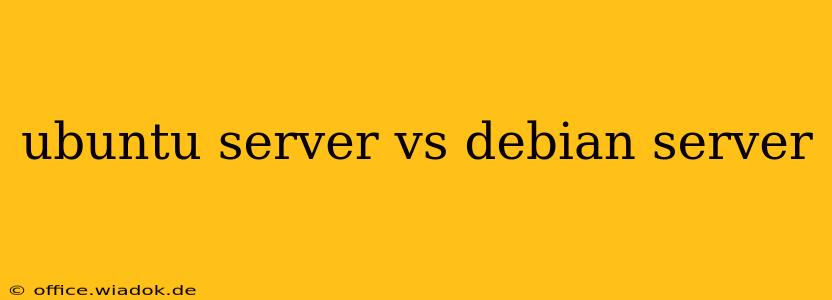Choosing the right Linux distribution for your server can significantly impact your experience. While both Ubuntu Server and Debian Server are popular choices based on the Debian base, they cater to different preferences and priorities. This comprehensive comparison will help you understand the key differences and choose the best fit for your server needs.
Key Differences: Ubuntu Server vs. Debian Server
Both distributions share a common ancestor, but their approaches to package management, release cycles, and community support diverge.
1. Release Cycles and Stability:
-
Debian: Debian follows a relatively slower, more deliberate release cycle. Its stable releases are renowned for their rock-solid stability, prioritizing bug fixes and security over adding the latest features. This makes Debian an excellent choice for mission-critical servers where uptime and reliability are paramount. You'll find fewer breaking changes between releases.
-
Ubuntu: Ubuntu adopts a faster release cycle, releasing new Long Term Support (LTS) versions every two years. While offering newer features and software versions, this comes with a slightly higher risk of encountering bugs or compatibility issues in the initial releases. However, the LTS versions offer extensive support and stability, making them a good compromise between stability and access to modern software.
2. Package Management:
Both distributions utilize the APT (Advanced Package Tool) package manager. However, Ubuntu's approach to managing packages often integrates newer software versions more quickly than Debian's more conservative strategy. This can be a benefit for developers wanting access to the latest tools and technologies, but it might introduce instability if not managed carefully.
3. Community and Support:
-
Debian: Debian boasts a large and highly active community, known for its dedication to open-source principles and collaborative development. While the community is vast, the support structure might feel less centralized than Ubuntu's.
-
Ubuntu: Ubuntu benefits from Canonical's commercial backing, resulting in more readily available support options, including commercial support contracts for businesses. This translates to potentially easier troubleshooting and faster resolution of issues, especially for users who prefer professional assistance. Its extensive documentation also contributes to a more user-friendly experience.
4. Ease of Use and Desktop Environment:
While this comparison focuses on server versions, it's worth noting a key distinction. Ubuntu typically offers a more user-friendly experience, especially for those familiar with other desktop-oriented Linux distributions. Debian, with its focus on minimalism, might require more technical expertise, particularly when configuring a server. However, both server versions minimize a graphical interface, focusing on command-line management.
5. Software Availability:
Both distributions provide access to vast repositories of software packages. However, Ubuntu's repository often includes newer versions of applications due to its quicker release cycle. Debian's focus on stability means you might encounter slightly older versions of some software packages in its stable repositories, but this translates to increased reliability and reduced risk of compatibility problems.
Which Distribution Should You Choose?
The "best" distribution depends entirely on your needs and priorities:
Choose Debian Server if:
- Stability is your top priority: Mission-critical applications, servers requiring maximum uptime.
- You prefer a conservative approach to software updates: Minimize the risk of breaking changes.
- You're comfortable working with a command-line interface and navigating a larger, more decentralized community.
Choose Ubuntu Server if:
- You need access to the latest software versions: Development environments, applications requiring current technologies.
- You prefer a more streamlined and user-friendly experience (relatively speaking for a server OS).
- You value readily available commercial support options: Especially beneficial for businesses needing professional assistance.
Ultimately, both Ubuntu Server and Debian Server are robust and capable choices. Carefully consider your server's purpose, your technical expertise, and your tolerance for risk when making your decision. Understanding these core distinctions will empower you to make the most informed choice for your specific server environment.

